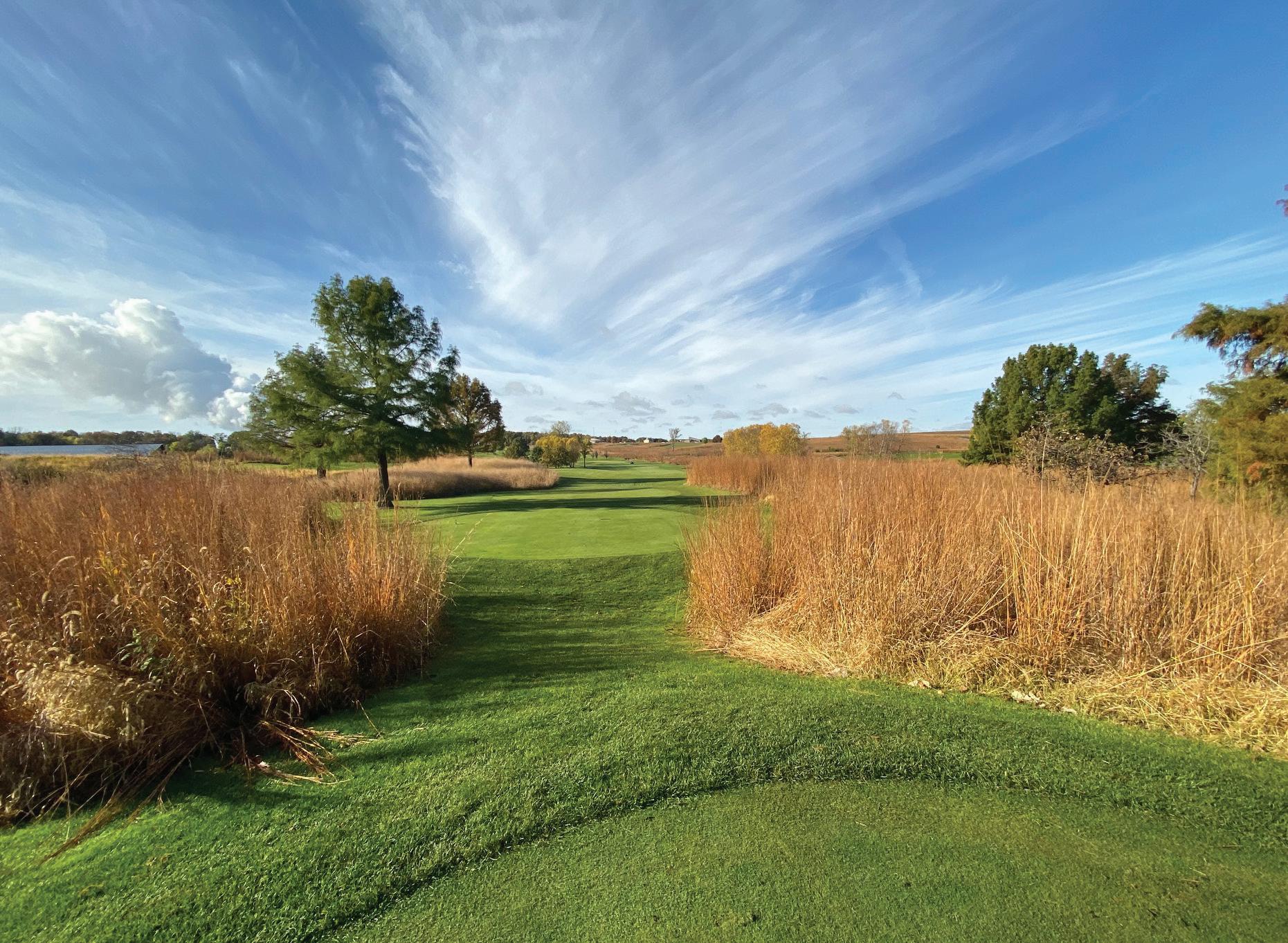Rock Valley
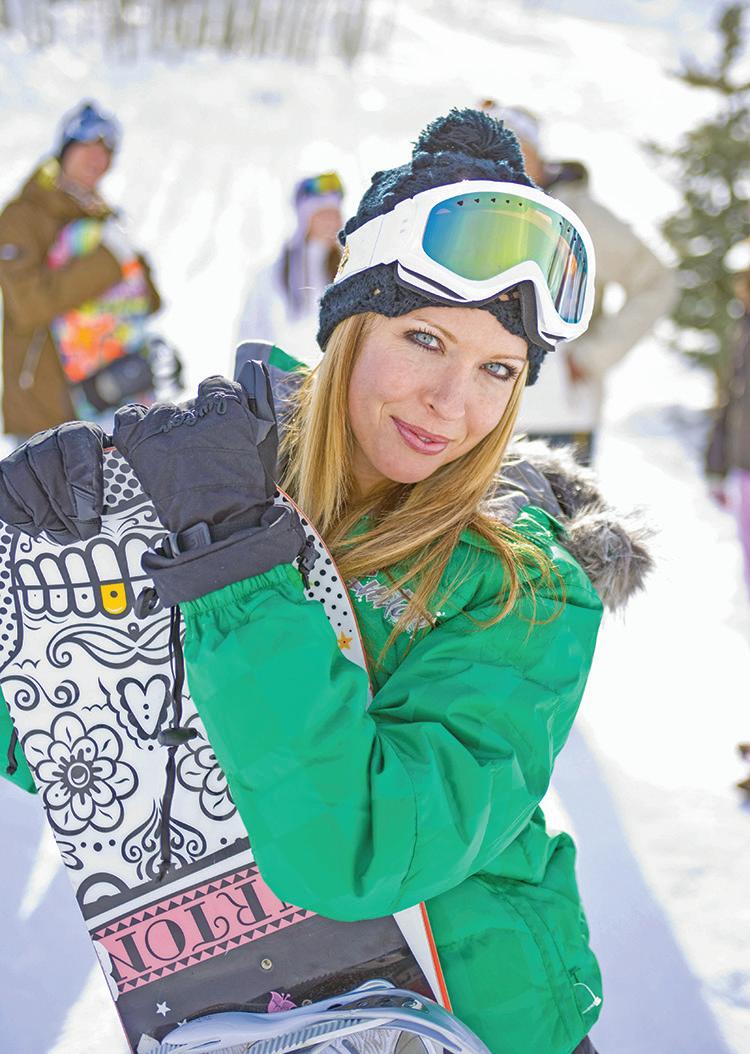




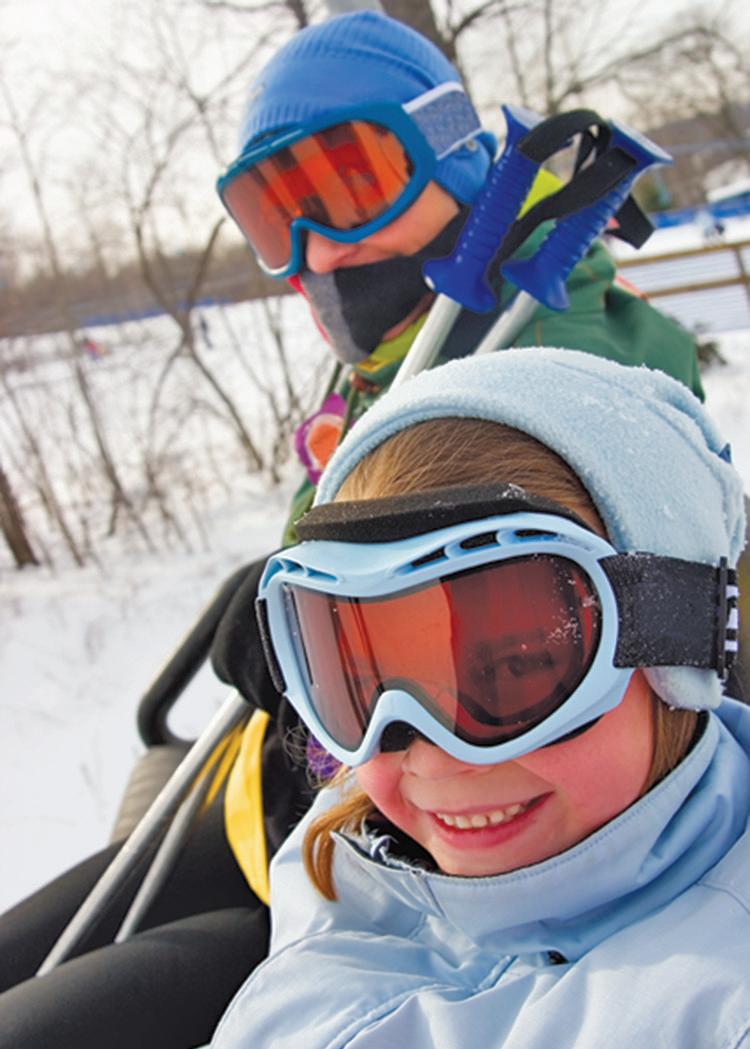





Chiseled out of the state’s far northern region is Rock Cut State Park in Winnebego County. Nearby are other “rocky” landmarks - the mighty Rock River and the place where wagons once forded it, Rockford. It’s an area of rolling plains, interesting history and recreational variety.
Two lakes set off the park’s 3,092 acres. Pierce Lake, with 162 acres, is a retreat for people wanting to fish, ice fish or ice skate. A second 50-acre Olson Lake is especially for swimmers.
Rounding out the park’s recreational options are camping, hiking, horseback trails and cross-country skiing. Whatever the season, you can be sure there’s quite a bit of activity going on at Rock Cut State Park.
Hours
Summer hours (April – Oct.) 6 a.m. to 10 p.m. Winter hours (November - March) 8 a.m. to 5 p.m.
By the middle of the 17th century, Miamispeaking tribes of Native Americans entered the region of Rock Cut State Park after the Iroquois drove them from territory on the southern end of Lake Michigan.
From about 1655 until 1735, the Rock River was within the range of the Mascouten, who were also pushed westward by the Iroquois.
The Winnebago ranged southward from Wisconsin to the Rock River from the 1740s until 1837, while the river’s upper portion was on the periphery of the Fox and Sauk territory from about 1765 to 1833.
By 1800, the Potawatomi, Ottawa and Chippewa nations had extended their range into the area, but they ceded their lands to the United States 32 years later following the Black Hawk War.
The region that is now Rock Cut State Park was settled partly by Scots around Argyle - named for their Scottish home of Argyllshire - and partly by Canadians, New Yorkers and New Englanders around the town of Harlem - named for New York City’s Harlem.
The Illinois version of Harlem was moved in 1859 when the Kenosha-Rockford Rail Line was built. The dammed waters of Pierce Lake now cover much of the railroad bed within the park, although portions of the railroad grade are visible along Willow Creek below the spillway.
But blasting operations in a rock outcrop that railroad crews conducted during the
1859 construction left lasting impressions here - they cut through rock to provide a suitable roadbed and gave Rock Cut its name.
Because water serves as a welcome mat to birds and animals, wildlife watchers to the area won’t be disappointed. Birders report good viewing, with waterfowl being abundant. Deer, fox, muskrat, woodchuck and beaver inhabit Rock Cut State Park as do opossum, raccoon and both gray and fox squirrel.
Over 100 types of wildflowers offer a showy display each spring and summer, while the hardwood trees dazzle you with their reds and golds every fall.
The trail system at Rock Cut offers opportunities for hiking (40 miles), mountain biking (23 miles), and equestrian (14 miles) and has been completely remarked. Trail users will find updated trail head/information signs at picnic areas and trail access points for trail information and regulations.
Only certain trails are designated for mountain biking and equestrian use and are identified by colored trail markers. Blue trails are for mountain biking and hiking, yellow trails are for equestrian and hiking and red trails are restricted to hiking only.
Trail activities have been divided into “summer and winter” seasons to provide quality seasonal programs. The “summer program” (mountain biking and equestrian) trails are open April 1 – Nov. 30. These regulations for mountain biking and equestrian use will be strictly enforced and violators are subject to fines.
The “winter program” provides for groomed cross-country trails as conditions permit. The groomed trails are best accessed at the Lions Club Picnic Area.
As a courtesy, hikers and snow shoers are asked to use other trails that have not been groomed for skiing. A winter trail guide is being developed to better describe the trails groomed for classical skiing and those groomed for freestyle/skating.
Rock Cut also offers access (at the Pierce Lake spillway) to the Willow Creek Bike Trail and Perryville Path, a paved trail system connecting the local communities of Loves Park and Rockford to Rock Cut State Park.
For those who want to include an overnight stay in their visit to Rock Cut, the
park offers 28 Class A-Premium sites for reservation, 210 Class A-Premium sites and 60 Class B-Premium sites on a first-come first-serve basis.
There is also a primitive cabin available for reservation. It has electricity, but does not have water or plumbing facilities.
Open year round, the campgrounds provide water, electricity, sanitary dump stations, showers, toilets, a boat launch and playground equipment. Only electricity and pit toilets are available in the winter season. Equestrian camping is restricted to a site on Hart Road.
Groups of more than 25 persons need advance permission from the site superintendent before they can enter the park, and all campers require a permit from park personnel. Alcohol is prohibited in the campground.
One of the park’s most popular activities is fishing Pierce Lake - named for state Rep. William Pierce of Rockford, who served in the legislature from 1951-1966 and who proposed the first land acquisition for the park in 1955.
The lake is stocked with largemouth bass, bluegill, redear sunfish and channel catfish, as well as bullhead, northern pike, muskellunge and walleye. Pierce Lake will allow any size engine on the lake, however, engines over 10 hp can operate at No Wake speed only.
Paddle & Trail Bait Shop is open at Pierce Lake with Canoe, Kayak and boat rentals, they also have various types of bait available. for more information and prices, call 815885-4740.
Pierce lake also has docks and two launching ramps available. Olson Lake also offers excellent fishing. Carry on watercraft and electric motors only.

Hunting
The hunting program allows disabled hunters an opportunity to participate in a Department of Natural Resources program for managing the deer herd and turkey populations at Rock Cut State Park.
Swimming
Olson Lake Beach will be operated this summer (Memorial Day weekend to Labor Day weekend) by contract of Beachwater Lifeguard & Lake Patrol.
The Lake is open from noon to 7 p.m. Admission is only $5 for anyone over 48”, $2.50 for any under 48”, and free for all kids three years of age and younger. For
additional information call 815-885-9084. or view their website at www.beachwatch.net
Knowing that a visit to a state park is more fun when there’s food to be enjoyed, Rock Cut has picnic areas scattered throughout the park. Each is complete with tables, outdoor stoves, and pit toilets. Red Oak and Puri Crest have playgrounds.
Check out the newest addition, Lone Rock Cafe features wireless internet, a variety of food items and drinks including smoothies and blended coffees. They are open May – October from 7 a.m. – 7 p.m. daily, For additional information call 815/885-4740.
Several features make Rock Cut State Park accessible to the disabled. Two fishing piers are available, including a covered pier at the Lions Club day use area. The area, which is totally accessible for the disabled, features paved walkways, toilets, and a picnic shelter. The park’s campground area has flush toilets and showers that can be used by disabled visitors. Handicapped parking spaces are located in all of the park’s lots.
Directions
I-90 West to Rockford. Take the Highway 173 Exit. Go West for one-half mile to the Park Entrance.
The Winnebago County Forest Preserve system offers many locations with enjoyable fishing. Most of the preserves are located along one of the county’s four beautiful rivers: the Sugar, Pecatonica, Kishwaukee and Rock Rivers offer scenic stream bank fishing as well as access areas for fishing boats. Four Lakes Forest Preserve, a former fishery site, offers comfortable and productive bank fishing and the area’s smaller streams add to the variety of fish available. Fishing in forest preserves requires a valid Illinois fishing license.
Check out Rod and Reels for up to 1 week at a time – FREE!
Must provide name, address, telephone, and driver’s license number.
Stop in at Forest Preserve Headquarters, 5500 Northrock Drive, Rockford, MondayFriday, 8:00-4:30pm. Provided by Forest Preserves of Winnebago County in partnership with the Illinois Department of Natural Resources.
FOUR LAKES
Four Lakes is 186-acres containing four small man-made lakes. This is the District’s most popular fishing area. Fish stocked include: bluegills, channel catfish, largemouth bass, walleye, brown bullheads, redear sunfish, northern pike. No minnows are allowed for bait use to prevent diseases and invasive fish species.
KILBUCK CREEK
This small picturesque stream offers catfish at its mouth, and upstream, in the deeper slow pools, by logjams, and below the small dam west of the Highway 51 bridge. Smallmouth are more common upstream in the rocky pool riffle areas. Other game fish and carp can be taken infrequently. Redhorse, suckers, and a variety of minnows abound in Kilbuck Creek.
KISHWAUKEE
The large, deep pools especially at the river’s bends have yielded many three to five pound smallmouth bass. The rocky areas from the Kishwaukee River Forest Preserve to the mouth of the Kilbuck Creek offer excellent smallmouth habitat.
An occasional northern or walleye may be caught as they travel the river extensively in search of minnow prey. Catfish are also very common through this stream and are especially abundant at the mouth.
The “Pec” offers excellent fishing for channel catfish, carp and northern pike. Channel and flathead catfish are abundant in logjams everywhere. Northern pike spawn in the backwater areas near Meridian Road and are ever present in brush, logjams and at the mouth of many of the tributaries.
Walleye, too, are surprisingly common for the apparent murky water. The greatest numbers are found in sand areas near the mouth and in flooded willows and smartweeds below the riffles from the Village of Pecatonica to Pecatonica River Forest Preserve. Smallmouth bass are common at the mouth over the rocky
shorelines of the Rock River but absent elsewhere. Carp and buffalo are common in the backwaters where occasionally crappies and bluegills may be taken.
The Rock offers a variety of fishing opportunities from the swift, shallow, rocky-sided channels below South Beloit to the larger, deep and sluggish pools above the two low dams in Winnebago County. Channel catfish is the most abundant game fish in the river. Carp are abundant in shallow mud-bottomed pools, especially in slack current, and near brushy areas. Bullheads, too, frequent these areas. Walleye are more common below the dams, especially in March and April as they congregate to spawn. Northern pike congregate in marshy areas in early spring to spawn.
As spring turns into summer, northern pike move extensively and are often found in tributary streams, feeding on smaller fish. Crappie, bluegill and largemouth bass are found in backwater areas and
above dams where the water is more still. Smallmouth bass are increasing in numbers and are found over rocky areas where there is a moderate current such as below the Fordham Dam at the Atwood Homestead Forest Preserve.
The name Sugar River is derived from the Indian work “ke-pot-ah” meaning “sweet water.” One might hypothesize this name is the result of the sand in the water rather than from its taste. Like the Pecatonica, the Sugar River valley is an ancient lakebed. However, the striking difference in water clarity is a result of the sandy basin through which the river drains. Sandbars and deep holes alternate to compliment the occasional sheer sand bluffs, which shape the river valley.
The Sugar is an excellent stream for the fisherman who wants little of development and other people. The logjams and sand bottom provide excellent fish habitat. The channel catfish and smallmouth bass are the most common game fish. However, an
occasional walleye or northern pike will be taken near tributary mouths and at the mouth where the Sugar joins the “Pec.” Carp can be taken in the slow muddy areas near road crossings. Occasionally, bluegills and crappies will be found in the side channels and backwaters where there is little water movement.
Because public access is limited to two forest preserves and only two bridges, the Sugar is not the place for the canoeist demanding easy access and continuous comfort areas. When the water level is low, portages should be expected over sandbars and logjams. The most popular canoe trip requires launching at Avon, canoeing to Sugar River Forest Preserve, camping for the night and then canoeing to the mouth near Shirland. Canoes may also be launched at Colored Sands Forest Preserve or Yale Bridge Road.
Users of the Sugar River may expect to find nature at its wildest. However, it is important to realize this may mean poison ivy antidotes and mosquito repellants which are a must in the summer.
Sugar River
10127 Forest Preserve Road, Durand, Ill., 61024
All 70 sites in the main campground at Sugar River may be reserved online. Reservations MUST be made 7 days in advance.
Primitive sites are on a firstcome first-served basis.
?Please register at the attendant building, or in the absence of attendant, please use the self-registration station.
NOTICE: Sugar River Campground will be unavailable for camping reservations on the following dates:
Sept. 15-17
Seward Bluffs
16999 Comly Road, Seward, Ill., 61077
All 47 sites at Seward Bluffs may be reserved online.
Online reservations must be made seven days in advance. Please register with the campground host or in the absence of a host, please use the self-registration station.
Hononegah
#80 Hononegah Road, Rockton, Ill. 61072
No reservations available for sites at Hononegah, sites are on a first-come first-served basis. The host will register campers on a per unit basis after the units are established. Please register with the
campground host or in the absence of a host, please use the self-registration station.
Fees
Resident/Non-resident
Sugar River
Senior (62+) & disabled
Electric hookup (additional)
Primitive
Primitive-Senior (62+) and disabled
Three unit per site maximum (Tent-max of three; RV-max
of one and up to two tents)
$15/unit, $25/unit
$13/unit, $23/unit
$8/unit, $8/unit
$13/unit, $23/unit
$11/unit, $21/unit
Resident/Non-resident
Seward Bluffs and Hononegah
Senior (62+) & disabled
Electric hookup (additional)
Three unit per site maximum (Tent-max of three; RV-max of one and up to two tents)
$13/unit, $23/unit
$11/unit, $21/unit
$8/unit, $8/unit
Organized Youth Group
Camping by reservation only (per weekend reservation) (Hononegah, Pecatonica River, Rockford Rotary, Seward Bluffs and Sugar River)
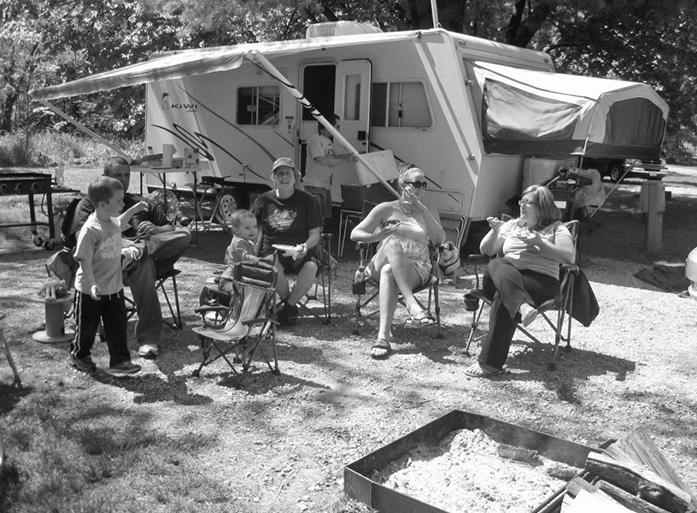
50 or less people
Over 50 people Resident/Non-resident $25, $35 $35, $45
Safety has been and will continue to be one of our top priorities. We have worked with and followed guidelines from the CDC, IDPH, Restore Illinois and local health officials to develop procedures and protocols to ensure we can provide a fun and safe recreational experience.
Our park district team has and will continue to increase efforts to clean and sanitize our facilities and program areas in accordance with CDC guidelines. We have incorporated creative ways to encourage and promote social distancing, implemented health screenings for both employees and participants, as well as updated our eligibility requirements to ensure the health and safety of all during this time.
The Nicholas Conservatory
On Oct. 29,2011, the Rockford Park District opened the doors to a brand new facility, Nicholas Conservatory & Gardens, 1354 N. Second St., Rockford.
Situated along the banks of the beautiful Rock River in Sinnissippi Gardens, Nicholas Conservatory & Gardens brings the tropics to the Midwest.
The entire facility is the third largest conservatory in Illinois with a total of 22,000 square feet, and at the highest point will stand 52 feet.
A tropical setting includes an 11,000-square-foot plant exhibition area complete with water features, seating
In 1843, Charlie Wilbur and his family came from New York and settled across the river from Byron, Ill. The farm, which is now called Heritage Farm, remained in the Wilbur family for five generations.
The Byron Forest Preserve has restored the farm buildings, so that future generations can discover what early country life was about. You can enjoy a free self-guided tour through the grout house. Take a peek in the barns at the local “residents.” A small fee may be charged for guided tours.
School field trips and group tours are encouraged. Children and adults can learn how to make cornbread over the fire and “churn” their own butter for it. Yum! When in season, groups learn about maple syrup and honey production and bottling too.
Heritage Farm is located at the Byron Forest Presreve, 8059 North River Road, Byron, Ill.
Museum hours
Open daily (April 1 – Oct. 31)
Monday – Friday 8 a.m. to 4:30 p.m.
Saturday 10 a.m. to 6 p.m.
Sunday 2 to 6 p.m.
Please call 815-234-8535 x217 to setup a tour.
areas, and sculptures, all in a tropical plant setting.
In early 2004, the Rockford Park District Board of Commissioners selected Sinnissippi Park as the site for a centerpiece project for the District’s 100year anniversary celebration. Sinnissippi Park was the first land purchased by the newly-formed Rockford Park District in 1909.
Nicholas Conservatory & Gardens is named after the Nicholas family, who in March 2006, announced their donation of $2,150,000 toward the Conservatory project in honor of their parents, William and Ruby Nicholas.
Aside from the generous donation from the Nicholas family, nearly 1,600 donors contributed to the Nicholas Conservatory & Gardens Public Campaign Project. Greenhouse vs. Conservatory
What’s the difference?
The former greenhouse was constructed in 1924 and was in need of significant repairs. A greenhouse is a building where plants are cultivated. A conservatory is used to display tropical plants and displays, and can be used for social gatherings.
The original 15-foot high Greenhouse’s
purpose was to grow flowers and plants that could be used throughout the Rockford Park District’s parks and facilities. This purpose changed as the Park District grew, and it became impractical for the Greenhouse plantings to support the entire District.
Over the years, the Greenhouse was used to host a variety of seasonal flower shows, but the building was not originally designed for this purpose. The former Greenhouse will be memorialized with a rendering and display incorporated into the new Nicholas Conservatory & Gardens facility.
Nicholas Conservatory & Gardens
Summary of Amenities
Indoor and Outdoor Gardens Open to the Public (year-round); Growing Greenhouse; Meeting Room and Classroom Space (available to rent); Tropical Destination for Small Weddings, Receptions, and Catered Events; Children’s Educational and Play Area; Garden Gate Gift Shop ; Sculptures; Catering Kitchen; Outdoor Terrace
Nicholas Conservatory & Gardens Fast Facts:
Large palms and tropical trees came from nurseries in Homestead, Fla.
Temperature inside the Conservatory is anywhere between 70˚ and 105˚
Every plant or tree has a label with the common and Latin name
Farthest Traveling Object: Aneityum palm from Vanuatu Islands of the Pacific Heaviest Tree: Bismark Palm weighing over 6000 lbs (3 tons)
Longest Installation of a Tree: Bismark Palm – 8 hours, 3 machines, and a dozen workers
Regular Admission
Adults: $7 (Resident) $9 (Non-Resident)
Seniors (65+): $5 (Resident) $7 (NonResident)
Veterans $4 (Resident) $6 (NonResident)
Ages 5-1:7 $5 (Resident), $7 (NonResident)
Ages 3-:4 $3 (Resident), $4 (NonResident)
Ages 2 and under, free
Hours
Sundays and Mondays: CLOSED
Tuesday-Friday: 10 a.m. to- 4p.m. $4 (Resident), $5 (non-resident
Wednesdays: 9 a.m. to 5 p.m.
Thursdays: 9 a.m. to 5 p.m.
Saturdays: 10 a.m. -to 3 p.m.
Krueger-Haskell Golf Course is located on the west side of the City of Beloit and opened May 1, 1927. When the course opened it was originally a 9-hole course. In 1931 the course was enlarged to an 18-hole course. Today the course is an 18 hole, par 70, 6158 yard course from the white tees. Our unique layout, mature trees and rolling terrain make it a challenging and enjoyable course for any golfer. Our course offers 4 different tee box settings on each hole, numerous bunkers, doglegs, and tight tree lined fairways. Five water hazards, four of which were added in 2010-2011 provide for a challenging round of golf. We also offer a practice green for golfers who would like to work on chipping and putting before their round of golf. Five hitting cages are also available at the clubhouse to warm up before your round of golf.
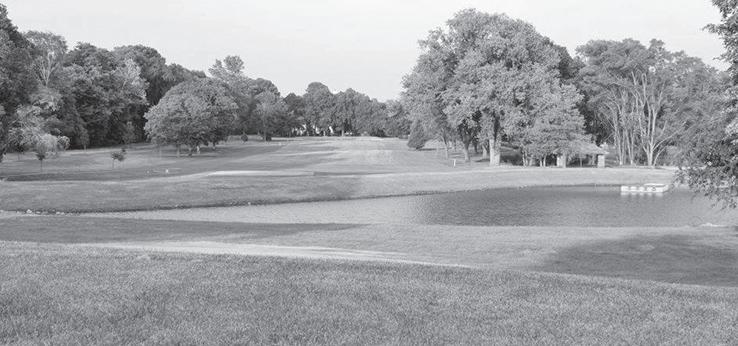
The golf course was named for Butch Krueger and Everett Haskell. Butch Krueger was the PGA Professional at Beloit Municipal Golf Course from 1936-1966. He brought national recognition to Beloit as a touring golf professional. He played in 12 U.S. Opens and finished in the top 20 4 times. He was the Wisconsin State Open champion 4 times
and the State PGA Champion 4 times.
Butch taught golf to thousands of Beloit golfers over several generations. Everett Haskell had many notable accomplishments and contributions to the City of Beloit and Krueger-Haskell Golf Course.
Everett was a native Beloiter, local businessman, city councilor, and an avid golfer and supporter of the golf course. The clubhouse offers a small merchandise area providing golfers with their basic golfing essentials; golf balls,
golf gloves, and tees.
Food and a bar are located inside the Krueger-Haskell clubhouse which provides a friendly and relaxing atmosphere for golfers after their round of golf.
They provide a variety of different food and beverage options, as well as large group catering and beverage service on the course.
Hospitality, great customer service and affordability make Krueger-Haskell Golf Course the ideal place to play golf.
The J. Weiskopf Observatory, with its 11” Celestron reflecting telescope, is available for public viewing and special programs. During the weekly FREE public viewing sessions, experienced staff will guide you through the night skies. Visitors will see the planets, the moon, and fainter objects in the sky. Special events and programs are offered as amazing events take place in our skies like meteor showers, solar and lunar eclipses, and when a planet is easily visible. For viewing conditions please call 815-234-8535 ext. 216. at Weiskopf Observatory in the Byron Forest Preserve.
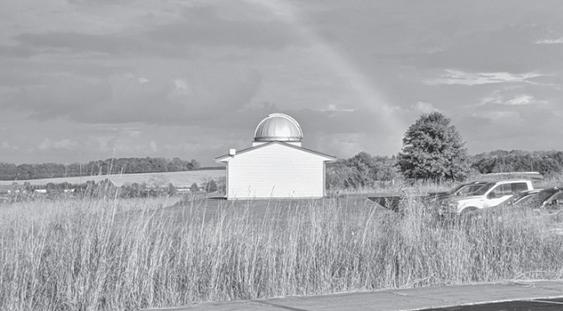
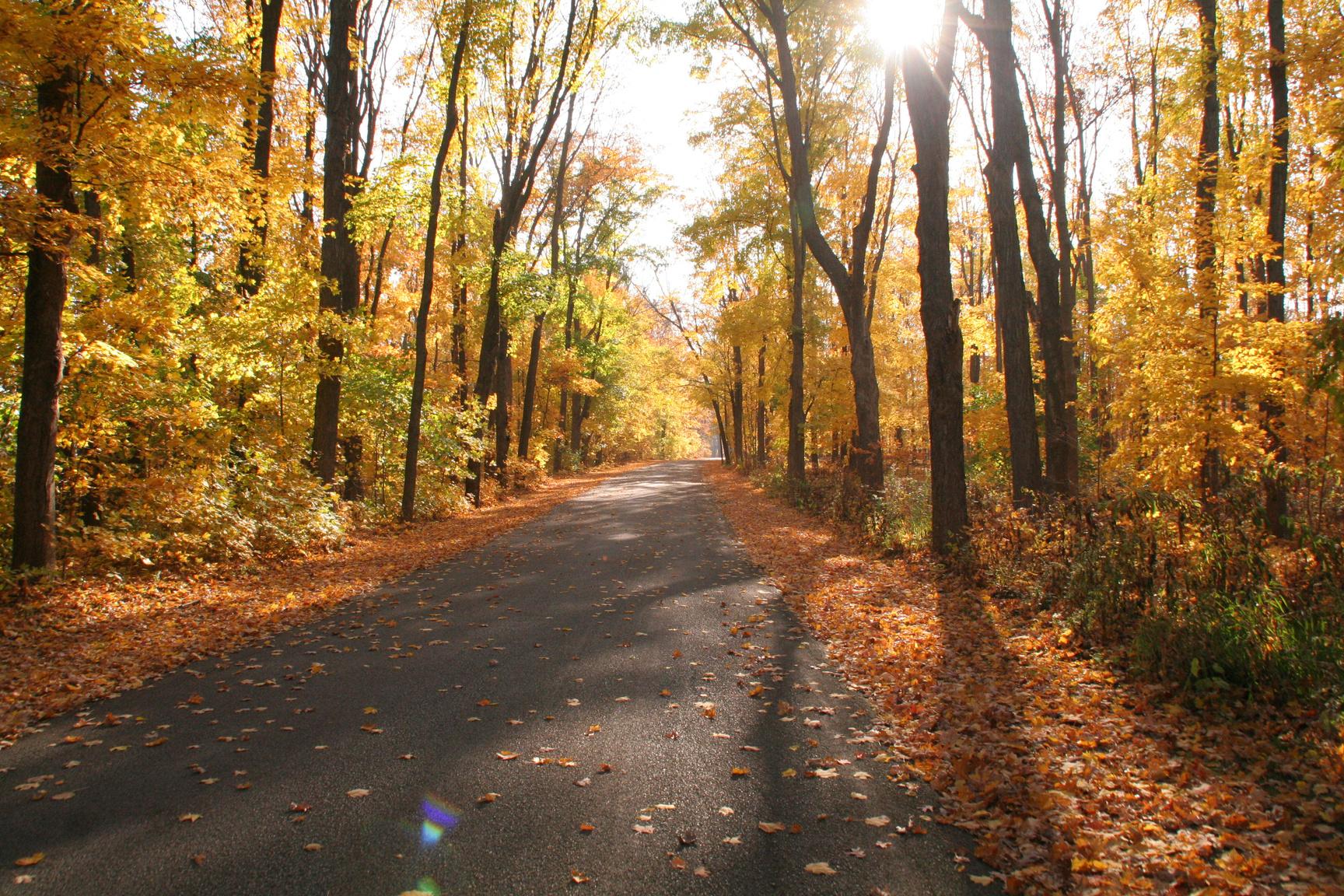
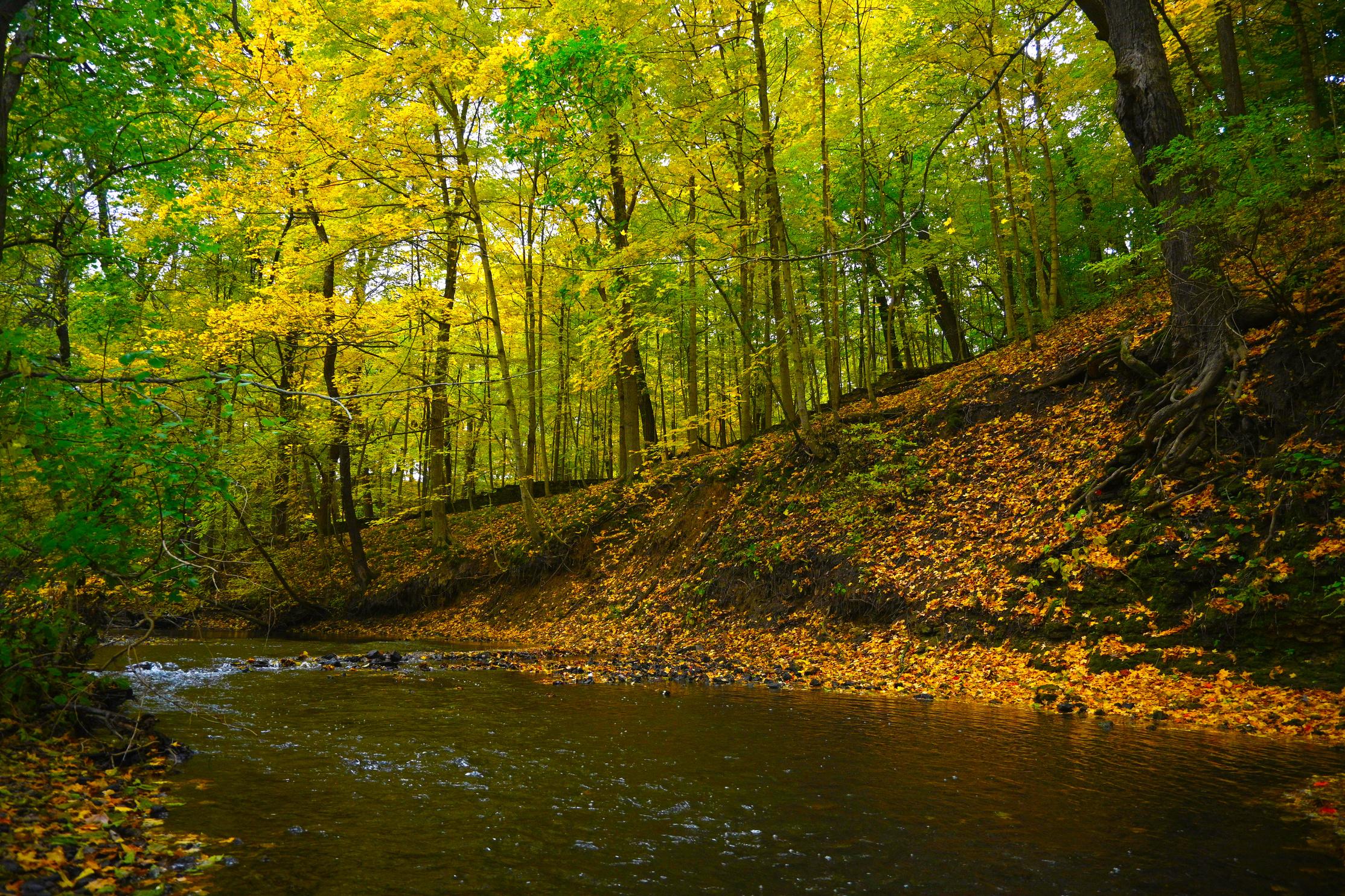

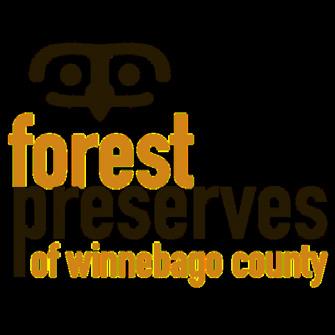






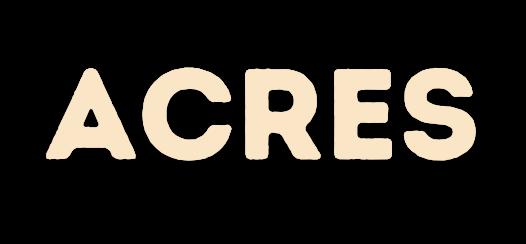


Visit the Jarrett Prairie Center Museum that boasts amazing views of the Jarrett Prairie Nature Preserve along with more than 4,000 square feet of exhibits and hands-on learning opportunities for visitors of all ages.

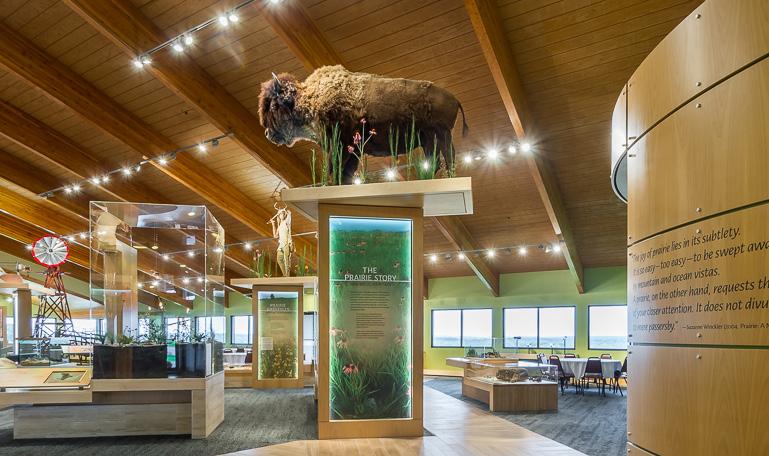

West is surrounded by a bike wanders through prairie, and oaks on the north end athletic fields on the south. It tennis courts, lighted basketball lighted baseball diamonds, fields, sand volleyball courts, horseshoe pits, playgrounds, a skate splash park and a boardwalk.
local prairie ecology. The ever popular Wolf Den bur oak tree exhibit is located in the theater for all of the little ones to enjoy climbing in and out and through, finding what may live inside our bur oak trees!
Oregon Trail Road
815-732-3101
oregonpark.org/park-west
There are several large natural history and historical dioramas, fossil exhibits, prairie restoration information, an interactive prairie agriculture exhibit that allows visitors to design their own farm, and some live exhibits including box turtles, a fox snake, and honey bees.
Visitors can take a step out on the 2,600 square-foot wrap-around outdoor observation deck to take a look at the scenery for miles as the Jarrett Prairie Center is located on the third highest point in Ogle County.

available for rental groups is a state-of-theart kitchen area sponsored by Prairie Forge Group of St. Charles, Ill. who served as architects for the 2016 museum renovation project. OSF Medical Group was also a generous sponsor of the renovation.

Jarrett Prairie Center is located at 7993 North River Road, Byron, Ill.
Splash Canyon Spray Park
Visitors can relax in the Byron Bank Immersive Theater while learning about

Prairie Side Skate Park have hours; check the website ahead
Nash Home/ County
Historical Museum
1878 in Midwestern prairie architecture, the Nash Home and Museum, which opened in 1962, originally was home to Chester and his family. His daughter, taught school from 1891 to Nash School, now Nash RecreCenter, was named after her. museum offers artifacts from the county — some from the settlers.
111 N. Sixth St. 815-732-7545
oglecountyhistoricalsocior find The Ogle County Historical Society on Facebook a.m.-noon Thursday and Sunday, May through Sepselect Saturdays (May 26, Sept. 1, Oct. 6, and Nov. 24) appointment

Admission: By donation POLO
Aplington House
1853 home belonged to Zenas Aplington, a Civil War soldier who Polo. Abraham Lincoln nights in the house in 1856.
The deck also enhances the already unique space for those who rent the facilities for family gatherings, weddings, and other social and corporate events. Also
Golfers and guests can watch the virtual action from the indoor viewing areas right off of the driving bays at PrairieFire, or they can grab a seat outside to keep an eye on the action. Customers can also grab a drink or a bite to eat, and watch players’ progress on screens. See the listing on page 47 for more information.
Visitors will see period clothing and hats, exhibits of churches and schools, and Underground Railroad exhibits.
Address: 123 N. Franklin Ave.
Phone: 815-946-4142
Online: polohistorical.org/properties
Hours: By appointment
Admission: By donation
Buffalo
The kiln, constructed in 1870 of native limestone quarried on site, is one of two old lime kilns in Illinois on the National Register of Historic Places. It is a wood-burning perpetual kiln, or draw-down kiln, which meant it had to be continuously fired. It operated until the early 1900s.
Address: Galena Trail Road
Phone: 815-946-4142
Online: polohistorical.org/properties
This 1854 brick home, the first of
its kind in Polo, belonged to the town’s first doctor, W W. Burns. Today, it is the office of Blackhawk Waterways Convention and Visitors Bureau.
Address: 201 N. Franklin Ave. Phone: 815-946-4142
Online: polohistorical.org/properties and visitnorthwestillinois.com/ what-to-do/history-and-heritage/ burns-house.html
visitors on pr airie ecology
Design your own far m at our plow exhibit in the season at our pr airie over look ar ea

Hours
Sunday: 9 a.m. to 4 p.m.
Monday-Friday: 8 a.m. to 4:30 p.m.
The 1878 school is on the Galena Trail, where Abraham Lincoln walked during the Black Hawk War in 1832. It features displays about the war and a World War II hemp mill.
Saturday: 9 a.m. to 4 p.m.
Hours may vary due to private rentals.
Address: State Route 26, south of Polo
For more information call 815-234-8535 x200.
Phone: 815-946-4142
Hours: Wednesday afternoons, April through October, and by appointment

Online: polohistorical.org/properties
The building, a gift to the Polo Historical Society from Shaw Printing Co., houses vintage printing machines along with military memorabilia, surveying tools used to plot the Galena Trail in 1833, historic agricultural tools, and many other artifacts.
Address: 113 N. Franklin Ave.
Phone: 815-946-4142
Online: polohistorical.org/
Hours: 9 a.m.-4:30 p.m. Friday and Saturday, and by appointment
above: Visit the Jarrett Prairie Center Museum that boasts amazing views of the Jarrett Prairie Nature Preserve along with more than 4,000 square feet of exhibits and hands-on learning opportunities for visitors of all ages. at left: Visitors can take a step out on the 2,600 square-foot wrap-around outdoor observation deck to take a look at the scenery for miles as the Jarrett Prairie Center is located on the third highest point in Ogle County. The deck also enhances the already unique space for those who rent the facilities for family gatherings, weddings, and other social and corporate events.
Hours: 8 a.m.-4:30 p.m. MondayFriday
Judge Campbell was Polo’s first mayor; his office was built in 1875 from blue limestone hauled by wagon from the quarry west of town. It now is a private law office.
Address: 111 N. Franklin Ave.
Phone: 815-946-4142
Online: polohistorical.org/properties
Hours: By appointment
This is the very first gasoline filling station in Rochelle and the first filling station built along the Lincoln Highway in Illinois. It has been restored to its original design, including the canopy over the pumps and the 1918 equipment. Filling station memorabilia is on display inside.
Address: 500 Lincoln Ave. Phone: 815-561-2084

Online: enjoyrochelle.com/onlinedirectory/what-to-do/historyattractions/1918-standard-oil-fillingstation
Hours: By appointment

Supporting veterans is a worthy endeavor at any time of year, though such efforts tend to be more prominent in November.
Veterans Day is celebrated annually on Nov. 11 in honor of the millions of individuals across the United States who are military veterans. The day coincides with holidays such as Armistice Day and Remembrance Day, which are celebrated in other countries and also honor military veterans.

There’s no denying that veterans need the support of the people whose freedoms they protect. According to a 2021 study from researchers at Brown University’s Watson Institute for International and Public Affairs, the percentage of veterans with disabilities is significantly higher among post-9/11 veterans (40 percent) than it was with veterans from previous eras (25 percent for Gulf War I veterans and 13 percent for veterans of previous wars). Veterans can benefit from support legislated by elected officials in Washington, D.C., but there’s also many things ordinary citizens can do to show how much they appreciate the sacrifices veterans and their families have made and will make in the years to come.

The United States Census Bureau reports that more than one-third of the nearly 3.8 million men and women who have served in the U.S. Armed Forces
since September 2001 have a serviceconnected disability.

Many of these individuals are fighting to overcome physical injuries sustained while on active duty. Individuals who want to show their support for veterans can contact their local VA facility to arrange a visit to wounded veterans. Such visits can lift veterans’ spirits and reassure them that their sacrifices are both acknowledged and appreciated.

Though it might seem like a no-brainer, legislation to support veterans often faces an uphill battle to get passed. By supporting legislation that ensures veterans get the support they need, individuals can send a message to veterans that they haven’t been forgotten and that the very democratic principles they fought to protect are alive and well.
Citizens can write letters to their elected officials, urging them to support veteranfriendly legislation, and raise awareness of bills and laws through social media.
Data from the U.S. Department of Housing and Urban Development estimates that approximately 40,000 veterans are homeless on any given night. But that figure doesn’t tell the whole story, as the National Coalition for Homeless Veterans notes that, over the course of a year, roughly twice that many veterans experience homelessness. The NCHV believes that programs to assist homeless veterans should focus on helping them reach a point where they can obtain and sustain gainful employment. In addition, the NCHV feels that the most effective programs are community-based, nonprofit, “veterans helping veterans” groups.
Individuals can offer their support to such groups through financial donations or other means so they can continue to ensure no veteran sleeps on the street.
Veterans Day is a time to show veterans that their service and sacrifices are not taken for granted. Visiting wounded veterans and supporting efforts to ensure veterans get what they need to live full, healthy and happy lives is a great way to send the message that veterans are appreciated.
Drive through a suburban neighborhood in October and it’s likely you will find yards filled with inflatable witches, animatronic grim reapers and makeshift graveyards bearing witty sayings on tombstone and bony hands reaching out from the soil.
Decorating for Halloween has become big business, with consumers spending a collective $10.6 billion in this category in the United States in 2022, according to a survey conducted by Prosper Insights & Analytics and the National Retail Federation.
In fact, decorations, particularly outdoor decorations, were the second most popular way to celebrate Halloween (candy still reigns supreme).
According to research by LombardoHome.com, which looked at Google searches across the country, Las Vegas, Denver, Baltimore, Portland, Oregon, and Seattle were the top five states that searched the most for Halloween decorations on average per capita.
Carved pumpkins, skeletons and witch cauldrons topped the list of preferred Halloween decorations in America.

Halloween is an opportunity to pull out all the stops for this fun fall celebration. The following tips can help to turn any home into a Halloween haunt to remember.
Most people fall into one of two camps when decorating for Halloween. There are those who want their homes to be frightening and full of horrific details, and others who prefer more of a fall harvest
look. Identify your preferences and then gather decorative items accordingly.
Ideally, the best time to buy Halloween decorations is the day after the holiday when prices get slashed (pun intended). This is the time to stock up on items for next year. You can save anywhere from
50 to 70 percent when buying late in the season. For those who need new items for this year’s Halloween, close-out retailers like HomeGoods and TJ Maxx start putting out Halloween products in the middle of summer.
Stock up as soon as you see items, as they’re not likely to remain on shelves for long. By the time October rolls around, decorations may be gone.
Though some people just love covering every square foot of a property with all things Halloween, it’s also possible to make a big impact with minimal effort.
Lighting, or lack thereof, can create a spooky atmosphere. Swap existing porch lights with yellow or even black lights so everything glows. Candles flickering can add mystery.
Place some battery-powered or electric candles in windows for an eerie feel. Swap out your typical curtains with purple or black ones to drape the house in even more spooky appeal.
Wait on the carved pumpkins
Halloween seldom is complete without jack-o’-lanterns. But pumpkins often begin to degrade shortly after they’re first carved.
Use artificial pumpkins if you plan to decorate early; otherwise, wait until a day or two before Halloween to add freshly carved pumpkins to the Halloween scape. Children can come up with the design, but ensure only adults cut into the pumpkins.
Homeowners can quickly and easily transform their homes into spooky haunts this Halloween.
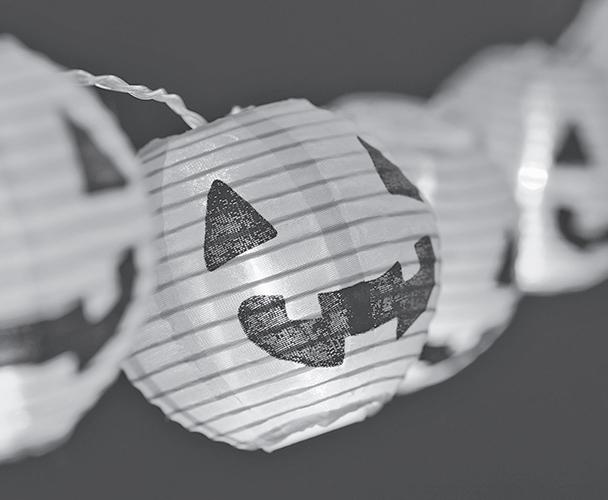
Those who want to make the most of Halloween can include travel plans in their schedules. North America boasts plenty of locations that have scary-sounding monikers, are supposedly haunted, or have attractions that will appeal to those looking for a few extra chills and thrills.
Salem is a prime spot to spend Halloween because of the events that took place there in 1692-93 surrounding the Salem Witch Trials. Mass hysteria among the area’s Puritans resulted in accusations, convictions and executions of people purported to be witches. Given witches’ relationship to Halloween, Salem is popular among tourists year-round, and especially so in October.
Visitors to Dallas, Texas may be expecting to see cows, horses or even oil rigs, but they also can visit a theme park devoted to Halloween fright. Screams Halloween Theme Park visitors can see five haunted attractions and additional entertainment.
Tombstone, Ariz.
This is the quintessential Wild West town made famous by Wyatt Earp and Doc Holliday. Resident ghosts are said to haunt the theater, and there are haunted hotels where visitors can stay. Some walking
ghost tours can make a visit even more frightful.
Hell’s Gate, British Columbia
Hell’s Gate is located on the Fraser River at a point where it narrows and becomes whitewater rapids. Visitors can take an Airtram down into the canyon to see Hell’s Gate up close or traverse a suspension bridge.
Many historic cemeteries offer tours around Halloween and at other times of the year. Green-wood in the borough of Brooklyn is one of them. Walk the winding paths on your own, or sign up for a private tour. While you’re in the area, take the Verrazano Narrows Bridge into Staten Island to visit the spooky-sounding Great Kills area. “Kill” comes from the old Dutch term meaning “creek.” Staten Island also has Arthur Kill and Kill Van Kull, which sound equally ominous.
“The Legend of Sleepy Hollow” is a classic story by Washington Irving featuring the fabled Headless Horseman. The real Sleepy Hollow is a small town along the Hudson River. During Halloween season, visitors can tour Gothic mansions and enjoy haunted hayrides, blazing pumpkins and more. Make sure you cross
Tourists in Savannah will find the city is billed as “America’s most haunted city.”
There are a wide range of architecture styles and plenty of spots that would be right at home in horror flicks. Tours let visitors explore the city’s haunted happenings.
Halloween is a time to enjoy the cool weather by traveling to locations with scary names and scenery.
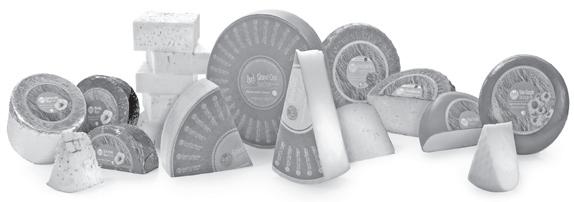
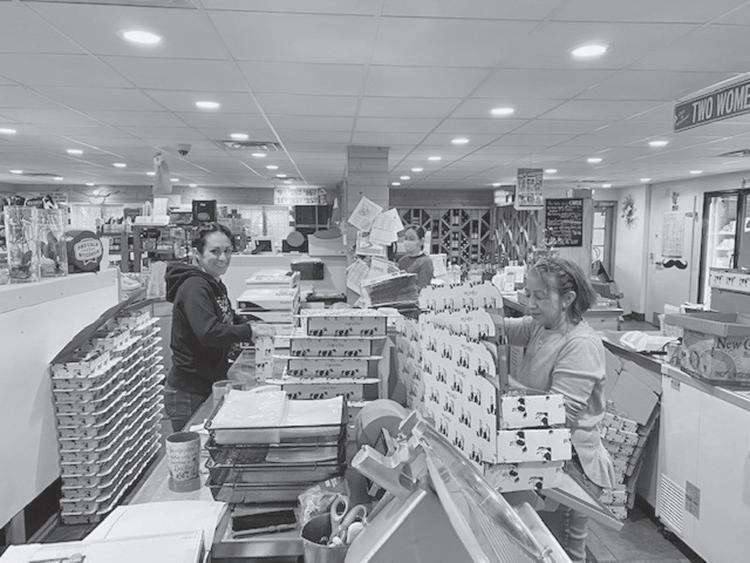
Tony and Esther Zgraggen, owners of the Alp and Dell Cheese Store, immigrated in the 1980’s to the United States from Switzerland. At that time they had a Dairy farm and for 5 years took cheese to the farmers market in Madison. After being absent from the Dairy industry for several years, they found the way back to the “cheese” with the purchase of the Alp and Dell Cheese Store in April 2009.
The Alp and Dell Cheese Store is located in Green County, the Heart of Wisconsin’s Dairy and Cheese Industry. Green County has about 400 Dairy farms producing 530 million pounds of milk




annually. In the remaining 13 Cheese factories in Green County, many master cheesemakers are busy turning this farm fresh product into Green County Gold.
The Alp and Dell Cheese store is a leader in quality, selection and price. Along with the local cheeses, Alp & Dell offers a nice selection of well known imported cheese from Europe. A well balanced selection of wines from throughout the world and some locally brewed beers round out our assortment. The Midwest magazine picked the Alp and Dell cheese store as one of the “must visit places” in the Midwest in 2011.
Each September, the Northern Hemisphere experiences the autumnal equinox, which marks the official beginning of fall. In the Southern Hemisphere, spring is arriving at this time.

Each year there are two equinoxes, the vernal and the autumnal (March and September, respectively). Shortly after the autumnal equinox, days begin getting shorter and the nights get longer. The autumnal equinox always occurs between September 21 and September 24. In 2021, the autumnal equinox takes place on September 22.

The word equinox is from the Latin “aequi,” meaning “equal,” and “nox” or “night.” That means that during each equinox the hours of day and night are nearly equal in length across the planet. During the equinox, the part of the Earth that is closest to the sun is the equator, explains History.com. That helps make night and day equal in length.
According to the Farmer’s Almanac, the Autumnal Equinox on Sept. 22, 2021, arrives at 3:21 p.m. EDT, 2:21 p.m. CDT, 1:21 p.m. MDT, and 12:21


Midway Village Museum, collects, preserves and interprets the diverse history of the Rockford region and is committed to educating and enriching our community by providing high quality exhibits, programs and events.
Vision: Midway Village Museum will be the primary institution where Rockford’s diverse citizens gather to understand their community’s past and to discuss the challenges of the future.
In 1968, Midway Village Museum was organized by the Swedish, Harlem and Rockford Historical Societies for the purpose of collecting, preserving and interpreting the history of the Rockford area. It began with a donation of land by the Severin Family and has grown dramatically since.
1972 – The original museum site was located on 11 acres donated by the Severin Family: today the site is 137 acres.
1974 – The development of Midway Village opened to represent a typical rural town in Northern Illinois during the end of the 19th and beginning of the 20th century.
1974 – The original 10,000 square foot Museum Center facility opened.
1976 – The Industrial Gallery opened.
1988 – The Old Doll’s House Museum opened along with additional galleries including the Aviation Gallery and the Carlson Education Gallery.
Midway Village Museum was organized in 1968 by the Swedish, Harlem and Rockford Historical Societies for the purpose of collecting, preserving and interpreting the history of the Rockford area.
It began with a donation of land by the Severin Family and has grown dramatically since.
In 1972, the original museum site was located on 11 acres donated by the Severin Family; today the site is 137 acres. The original 10,000 sq. ft. Museum Center facility opened in 1974.
The Industrial Gallery opened in 1976. In 1986 the Exhibition Hall was built to link the previous two buildings together. In 1988, more galleries were opened, including the Aviation Gallery and the Carlson Education Gallery. Across the parking lot, the Old Dolls’ House Museum was opened that same year.
Today, the 52,700 sq. ft Museum Center houses seven exhibition galleries, collections storage, classrooms, workrooms, administrative offices, library, audio-visual room, and the Museum Store. The 2000 renovation of the History Building made the facility handicap accessible and made the Museum Center more visitor friendly.
The collections have grown to over 110,000 objects, including threedimensional pieces, structures, textiles, and archival material.
The development of Midway Village began in 1974. The Village is representative of a typical rural town in Northern Illinois at the end of the 19th and the beginning of the 20th century. Midway Village features 26 historical structures, including a general store, hardware store,
print shop, blacksmith shop, schoolhouse, town hall, police station, plumbing shop, bank, hotel, hospital, fire station, church, barber shop, law office, two barns, and four farm houses.
Hours of Operations
Main Museum Center, Woodward Millhouse, Old Doll’s House and Museum
Gift Store Tuesday - Saturday, 10am - 4 p.m.; Sunday Noon to 4 p.m.
Victorian Village Guided Tours: Tuesday - Friday, 11 a.m., Noon, 1 p.m., 2 p.m., 3 p.m.
Admissions: Free admission for museum members and children ages 0-4.
Main Museum Center Exhibits
$9 Adults • $7 Child (ages 5-12) • $8
Senior (62+)
Victorian Village Guided Tours & Museum Center: $11 Adults • $9 Child (ages 5-12) • $10 Senior (62+)
Victorian Village Living History
Weekends & Museum Center
$13 Adults • $11 Child (ages 5-12) • $12
Senior (62+)
NOTE: Special events at right are priced separately. Please consult midwayvillage. com for pricing.
Beginning Saturday, September 9 and running through Sunday, Oct. 29, the Victorian Village will be open for tours by costumed History Interpreters.
On Saturdays, tours will begin on the hour from 11 a.m. to 3 p.m. On Sundays, tours will begin on the hour from Noon3pm.
Midway Village Museum outdoor special events are rain or shine with no refunds on admissions. No pets are
allowed on the grounds. Midway Village Museum is a smoke free campus. There is also no drone photography allowed.
2023 Free/Donation days
November: 1, 8, 14, 15, 16, 17, 21, 22, 29
December: 6, 12, 13, 15, 19, 20, 21, 22, 21
2023 Calendar of Events
The Calendar of Events details the hours of operation throughout the year, scheduled dates and topics of this year’s favorite signature museum special events, programs and fundraisers.
Inside the Main Museum Center
as a visitor you will view the permanent exhibits featuring thousands of artifacts related to history
Many faces, one community
This exhibit features stories of Rockford’s immigrants from 1834 to the present. Arrive through the train depot, stroll along 7th and South Main Streets, visit an immigrant home, and apply for a job at the Swedish furniture factory.
Only 20 years after its founding Rockford became an important regional center of government, industry, and commerce. Learn more about life in 1840s Rockford
Meet the Rockford Peaches and learn about these ladies who played hardball in the 1940s-50s.
Socks, Monkeys and Rockford’s industrial past
Monkey around with red heel socks and view the Nelson knitting machines. Find the sock monkey that helped win Rockford the title of “Home of the Sock Monkey.”
Flight gallery
Learn about local aviators like Bessica Raiche, and see Col. Bert Hassell’s 1928 SMI Stinson-Detroiter Airplane.
Industrial gallery
Rockford’s industrial geniuses created innovative products that impacted the local and worldwide economy.
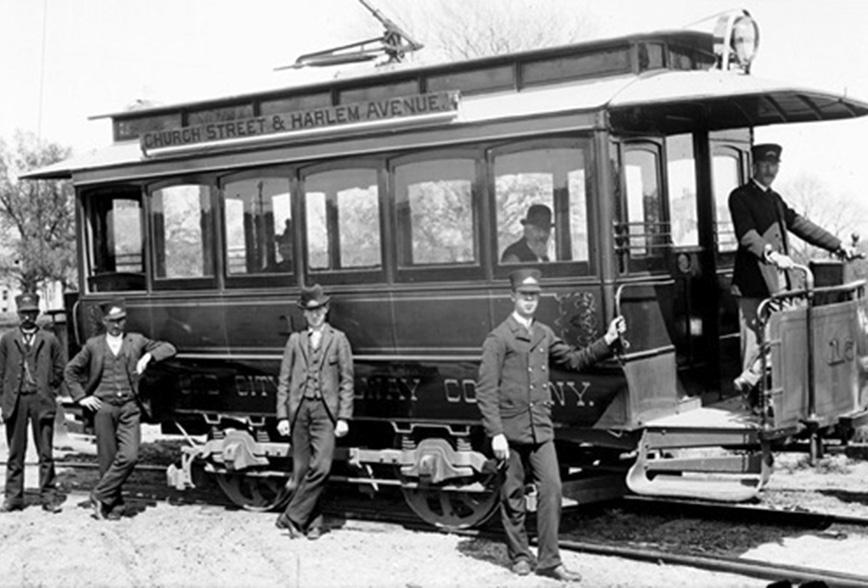
Adjacent
Old Doll’s House Museum: Outside the Museum Center, the Old Doll’s House Museum has 30 miniature homes representing different countries.
Woodward Millhouse
Tour an 1860s recreated mill with a functioning waterwheel located on Lake Severin.
Book your self-guided museum tour online or call us at 815-397-9112. You may purchase your admission when arriving at the museum. Tickets do not need to be purchased in advance, however you may choose to do so. Admission is on a first come, first served basis.
Midway Village is located at 6799 Guilford Road in Rockford. Parking is free and adjacent to the Main Museum Center building which is situated on the right side of the campus as you enter the grounds.


